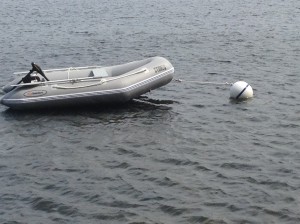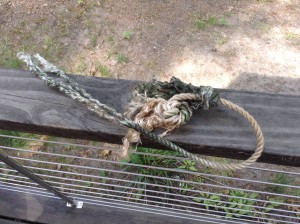
Gregory N. Hicks: U.S. must stay at the trade table
The Boston Tea Party remains one of the seminal events in American history, and it continues to resonate among political elites, because most Americans believe that the “Tea Party” was a protest about taxation without representation.
It really wasn’t. It was actually about the setting of rules for international commerce without representation. John Hancock, a signer of the Declaration of Independence, merchant, ship owner and one of wealthiest men in the colonies, along with the Sons of Liberty, instigated the Boston Tea Party because the British government had given the British East India Company a monopoly to transport tea to the colonies and sell it there, effectively excluding American merchants from competing in a trade in which they had been profitably engaged. From the very beginnings of our republic, Americans have demanded the opportunity to compete internationally on a level playing field.
Two thousand years ago, Roman Senator Marcus Tullius Cicero said “the sinews of power are money, money, and more money.” This observation is as true for the 21st Century as it was in the First Century BCE. National power comes from national prosperity.
Fifteen years into the 21st Century, it is clear that the international economy has entered a transition period similar to the change that occurred a century ago, when the United States emerged as the world’s leading economic power. When that occurred, the United States did not use its economic power to influence global events, instead adopting a foreign policy of isolationism and international disarmament.
“The business of America is business,” said President Coolidge, and America’s insistence on repayment of World War I debts contributed to economic instability in Europe. Isolationism led to the Smoot-Hawley Tariff, the Great Depression and World War II.
Fully cognizant of this history as well as the necessity of rebuilding the world’s economy after World War II, the U.S. government leveraged America’s overwhelming post-war economic superiority to establish the dollar as the dominant currency of international finance and trade and to found the multilateral institutions that are the girders of today’s rules-based international economic system. The relatively level playing field for international commerce that was created has led to 70 years of economic growth and prosperity that has lifted millions from poverty.
Economies rose from the ashes of World War II by adopting key aspects of the American economic model, but in 1990, the United States was still the world’s largest economy. Our nearest competitor, Japan, had a GDP only 40 percent the size of America’s; China’s GDP was less than one-sixth the size of ours.
Today, the United States is no longer the world’s largest economy; that status belongs to the European Union. Most economists project that China will soon overtake the United States as the world’s largest national economy, although some argue that milestone has already been passed. Meanwhile, India’s economy is not too far behind.
Despite the emergence of multiple global economic competitors, the United States remains the acknowledged leader and fulcrum of the international economy. Five major trends in the global economy – the internet impact on international commerce, the emergence of global value chains, the oil exploration technology revolution, the rebound in U.S. manufacturing, and the resilience of the dollar after the 2008 financial crisis – illustrate the centrality of the United States to both the international economy and international relations.
We’re all familiar with the Internet’s impact on our daily lives, and at work, we experience the internet’s effects on productivity, but on a larger scale, it is also transforming international trade opportunities. For instance, E-bay and Amazon are fostering an Internet-based international retail revolution. The first company makes it possible for any individual to engage in an international commercial transaction. Any American who offers a good on E-bay could find that it has been purchased by someone from Ghana or Fiji; and the reverse transaction is equally possible. For its part, Amazon, based on its global warehouse network and relationships with modern logistical companies, has built a virtual mall in which customers can buy almost anything and have it delivered to their doorstep within a few days.
Internet communication has also made cross-border vertical integration of production, or global value chains, possible. Pioneered by Nike and improved by Apple, the process is perhaps epitomized today by Gilead, a San Francisco-based pharmaceutical company that is saving thousands of lives by developing and lowering consumer drug prices through innovative production arrangements with pharmaceutical producers in a number of developing countries.
Global value chains are inducing a reconsideration of the statistical analysis of international trade, which is changing perspectives on international economic policy. Analysts are grasping the importance of trade in intermediate goods, i.e., components or partially finished goods that are moving across borders through vertically integrated production processes. For the United States, one-third of exports and three-fifths of imports are intra-firm trade in intermediate goods.
A recent International Monetary Fund study looked at the major economic powers from the standpoint of domestic value-added (DVA) and foreign value-added (FVA) in their national output. The study found that China’s economy is the most dependent on foreign value-added content of any of the major economies, while the United States is the least dependent. The study also suggested that if China let its currency, the Yuan, appreciate, it would both move up the value chain and reduce the dependence of its economy on foreign inputs. Perhaps tellingly, China’s leaders have been allowing the Yuan to appreciate steadily over the past decade.
“Fracking,” that uniquely American technological innovation, is also changing the international policy landscape, and if the U.S. resumes exporting oil and natural gas, could have an even greater impact. The current policies of Arab oil-producing states clearly reflect their unease with growing American energy independence, while Europe, through employing fracking to develop its own energy resources or importing American oil and gas, has the potential to reduce its energy dependence on Russia by substantial amounts.
The manufacturing sector provides the tools of national power, and a newly released Congressional Research Service study suggests that all the talk of the demise of U.S. manufacturing is premature. While China became the world’s top manufacturing country in 2010, the United States remains second by a wide margin. In addition, U.S. manufacturing output grew between 2005 and 2013 by 5 percent, despite the Great Recession. Much of this growth was powered by inward foreign direct investment, 39 percent of which has been landing in the manufacturing sector.
Despite setbacks to the dollar’s reputation arising from the international financial crisis, the dollar continues to symbolize American economic strength and prowess. The dollar’s central role in international finance and trade provides unique avenues for the United States to use economic power in lieu of military intervention or other forms of pressure to resolve international problems. Yet that unique role is under competitive pressure as China, the European Union, Japan, Russia, India and Brazil all seek to put their currencies on an equal footing with the dollar.
International economic policy offers the U.S. government a range of tools to advance U.S. foreign policy and commercial interests in an increasingly competitive, multipolar environment. Among those tools, preferential trade and investment agreements positively affect more aspects of economies than any other. Not only do trade agreements lock-in existing trading and investment patterns, they create new links by eliminating trade barriers through reducing taxes and writing new trade and investment rules that go beyond those found in the 1994 World Trade Organization agreement.
In national power, trade agreements not only generate economic growth, jobs, and tax revenue, but they also create economic interdependence among agreement parties. The voluntary acceptance of that interdependence is an unambiguous symbolic foreign-policy statement. In a multipolar world, such agreements are essential to economic competitiveness and peaceful coexistence.
Our competitors understand these characteristics very well, including the axiom, illustrated by the 1773 Tea Act that sparked the Boston Tea Party: “He who writes the rules, wins.” They are aggressively negotiating trade pacts around the world, changing the terms and rules of trade in their favor. Currently, the European Union, formed itself by a trade agreement, has 32 preferential trade agreements in place with 88 countries, and it is currently negotiating 12 agreements covering an additional 36 countries. India’s existing preferential trade network includes 26 countries via 14 agreements, and it is negotiating four new agreements covering 37 additional nations. Japan has implemented 14 agreements with 16 countries, and is negotiating three trade agreements covering 35 nations. China has 12 preferential trade pacts in force with 21 countries, and is negotiating three more agreements that would cover 14 additional states.
Completing both the Trans-Pacific Partnership (TPP) and the Transatlantic Trade and Investment Partnership (TTIP) negotiations would expand the U.S. preferential trade network consisting of 14 agreements covering 20 countries to an additional 33 nations. TPP and TTIP involve three of the world’s top four economies and cover a majority of the world’s existing trade.
Moreover, they seek to write new trade rules that facilitate the growth of 21st Century international trading patterns such as e-commerce, global value chains, and foreign investment, among others. As importantly, they revitalize longstanding strategic relationships with our Asian and European allies, an important signal to both China and Russia that the United States intends to remain a competitive actor in Asia and Europe. Conversely, failure to complete these agreements would be an act of unilateral economic-policy disarmament with long term consequences for U.S. economic growth and national power.
In a 21st Century world that is more multipolar, more complex, more integrated and more competitive than the United States has ever experienced in its history, U.S. competitors and strategic allies alike – Brazil, China, the European Union, Japan, India, and Russia – are seeking to amass economic power and to deploy it as a leading element of their foreign policies. In many cases, they seek strategic advantages through these efforts, often at the expense of U.S. interests.
International economic-policy tools such as trade negotiations provide an effective, peaceful means to compete with these challenges. If we do not participate in making the rules for international trade, others will write our companies out of the competition, many jobs will be lost and many more never created, and our national prosperity and national power will decline. If they were alive today, John Hancock and the Sons of Liberty would support the negotiation of TPP and TTIP. We should too.
Gregory N. Hicks is State Department Visiting Fellow at the Center for Strategic and International Studies, in Washington; an economist and a veteran U.S. diplomat. The views expressed in this article are those of the author and do not necessarily represent the views of the U.S. Department of State or the U.S. government. This piece stems from Mr. Hicks's remarks at the June 9 meeting of the Providence Committee on Foreign Relations (thepcfr.org)
Robert Whitcomb: Health-care beacons, Snowden, our big river
The Connecticut River at Orford, N.H. (See item at bottom.)
Much of American health care’s future can be seen in two synergistic kinds of institutions in Rhode Island.
One is Federally Qualified Health Centers (FQHCs). These facilities, set up around America, provide a wide range of free and insurance-subsidized clinical help for millions of patients, most of them low-income. The other is Johnson & Wales University’s spanking new Center for Physician Assistant Studies.
Consider the state’s biggest FQHC organization -- Providence Community Health Centers (PCHC). Its teams of physicians and other clinicians, such as nurses and nurse practitioners, work for what is the biggest single provider of primary-care services in Providence, with more than 35,000 patients. (I toured PCHC’s immaculate Prairie Avenue campus the other week, led by Merrill Thomas, its CEO, and Jane Hayward, the Rhode Island Health Center Association’s president.)
PCHC ‘s mission, it says, is to “provide neighborhood-based high quality and accessible primary medical care to improve the health status of the residents of Providence and surrounding communities regardless of their ability to pay.’’ FQHCs play especially important roles in inner cities and impoverished rural areas, such as Appalachia, where many physicians don’t want to practice, especially because of low reimbursement and so many difficult cases involving seemingly intractable behavioral-health issues.
Expanding primary care -- especially preventive care -- is essential if America is to improve overall health outcomes that are near the bottom of the Developed World while better controlling medical costs, which are the highest.
Whatever happens with the Affordable Care Act, the U.S. population’s aging (older means sicker); the daunting complexity of our health-insurance system; the permanent exit of many well-paying jobs; emigration to the United States of low-income people, and the decline of the stable, two-resident-parent family suggest that Federally Qualified Health Centers ought to play even bigger roles.
Of course, increasing the numbers of primary-care clinicians is essential for the long-term success of these clinics. Doing just that is the Johnson & Wales Center for Physician Assistant Studies, which has a beautiful building in Providence’s Jewelry District. George Bottomley, its director, gave me a tour the other week.
Its 24-month master’s program addresses the need to train many more non-physician clinicians who can perform highly professionally and cost-effectively some of the tasks now performed by over-worked (if highly paid) doctors. PAs are especially useful in getting patients to make the behavioral changes needed to prevent serious illness, in part because they can generally spend more time with patients than can physicians; many of the latter are more harried than ever because of onerous electronic-health-record duties and administrative pressures to boost patient volume.
J&W notes that PAs work in integrated medical teams to “provide diagnostic, therapeutic and preventive health-care services.’’ (By the way, the differences between physician assistants and nurse practitioners mostly involve some education details. They’re very similar professions.)
With physicians as supervisors, physician assistants take patients’ histories and perform exams; order lab tests; prescribe medications; diagnose illnesses; develop treatment plans, and counsel and educate patients.
No wonder that demand for PAs is surging. Forbes.com has listed Physician Assistant Studies as the “No. 1 Best Master’s Degree for Jobs.’’ The American Academy of Physician Assistants (AAPA.org) says that “demand for physician assistants and nurse practitioners rose by more than 300 percent in the last three years.’’
We’ll need Johnson & Wales PAs in droves in coming years as, technology, demographics and new cost controls continue to transform U.S. health care for all patients, especially in primary care, in which physician assistants will be at the forefront.
xxx
Edward Snowden – as a Russian spy and/or as an arrogant but naïve narcissist-- has provided vast amounts of U.S. security information to Vladimir Putin’s police state, perhaps resulting in the death of agents working for us. And he has aided the Chinese dictatorship’s relentless cyber-warfare against America. Some hero!
xxx
Last week we cruised the gorgeous Upper Connecticut River on a pontoon boat. Because it’s by far New England’s biggest river, on it you get a sense of what Mark Twain might have felt on the Mississippi. We yakked desultorily in the soft breeze about big projects we’d do – as if we were 30 years younger than we are.
Robert Whitcomb (rwhitcomb51@gmail.com), overseer of New England Diary, is a partner in Cambridge Management Group (cmg625.com), a healthcare-sector consultancy, and a fellow of the Pell Center for International Relations and Public Policy.
Global warming and too many people
Pope Francis was right to denounce mankind's destruction of the environment through fossil-fuel burning, etc But he didn't mention a gigantic factor in all this -- that the earth has too damn many people. A change in the church's birth-control policy would help reduce global warming. -- Robert Whitcomb
Paintings as a 'meeting ground'
"Green Connection, by JULIE JENSEN, in her show "Scenes Remembered at West Branch Gallery, in Stowe, Vt., through Aug. 11.
The gallery says that Ms. Jensen's landscape paintings are the things of memory: the way we recall a summer trip, a particular car ride, a fantastical moment. For Jensen, "paintings exist at the meeting ground between the external world and one's internal, emotional, and spiritual responses to it."
Charles Chieppo: Providence stadium bogus 'economic development'
BOSTON
As long as governments are made up of human beings, we can't expect them to be perfect. But they should learn from their mistakes, such as the whopper that Rhode Island state officials made in 2010 when they plowed $75 million into 38 Studios, a now-defunct video-game company started by former Boston Red Sox pitcher Curt Schilling.
Fast-forward five years, and another proposal that combines baseball, business and politics is on the table in Rhode Island. The owners of the Pawtucket Red Sox, Boston's top farm team, are asking for millions of dollars in taxpayer subsidies as part of a plan to build a downtown ballpark in neighboring Providence.
Under the proposal, the owners would spend $85 million to build the stadium and a parking garage. The state would take out a 30-year lease on the stadium land, for which taxpayers would pay $5 million annually in rent. The team would lease the stadium back from the state for $1 million per year, leaving state taxpayers on the hook for $4 million a year, or $120 million over the 30-year lease term.
The team is also asking city taxpayers for help. They want Providence to sign an agreement that would exempt the land from property taxes for 30 years.
The owners are following what has become a well-worn script for teams looking for stadium subsidies, warning that they will likely leave Rhode Island if the deal isn't approved. They've also commissioned the requisite economic-impact study, which estimates that the stadium would generate $12.3 million a year in direct spending for the local economy and about $2 million annually in state tax revenue. As usual with such studies, the owners call the projections "conservative."
Perhaps Holy Cross College economist Victor Matheson said it best when he told The Atlantic that, when it comes to these impact studies, "take whatever number the sports promoter says, take it and move the decimal one place to the left. Divide it by ten, and that's a pretty good estimate of the actual economic impact."
Building a minor-league baseball stadium in Providence would add little net new money to the local economy. The majority of fans would come from close by, meaning that they would likely spend their entertainment dollars at an area movie theater or restaurant if they weren't going to a game
As for benefits to businesses around the stadium, they tend to be limited to just a few blocks. And with 72 home games, what happens during the other 80 percent of the year?
The last time that Rhode Island leaders dabbled at the intersection of baseball, business and politics, it cost their constituents $90 million (the $75 million in principle invested in 38 Studios plus $15 million in interest). Some may conclude that such non-economic benefits as local pride or entertainment value would make a Providence stadium worth the investment, but they should know better than to view the proposal as genuine economic development.
Charles Chieppo (Charlie_Chieppo@hks.harvard.edu) is a research fellow of the Ash Center at Harvard's Kennedy School. This piece originated at governing.com.
Eurozone better without Greece
Greece is in many ways a corrupt Middle Eastern country (but I repeat myself) that should never have been admitted to the Eurozone. It would be better for the Eurozone if Greece left. And thank God that the European Union has not admitted Turkey. -- Robert Whitcomb
Jill Richardson: Despite the PR, still bad food at McDonald's
McDonald’s is floundering. There’s no other way to say it. The global fast- food chain has had declining U.S. sales for well over a year now. But why? I’d love to gloat that Americans have finally caught on that the Golden Arches peddles terrible food, but that might not be the case. Theories for the slump abound. Some believe that the menu is too confusing, slowing down service. Others say that consumers are drifting toward fast-casual chains like Chipotle and Panera, even if their food costs more. And Consumer Reports notes that McDonald’s has the worst-tasting burger compared to 20 competitors.
Even McDonald’s itself doesn’t seem to be sure. The company has introduced a Create Your Taste option, allowing consumers to customize their burgers. It promised to stop serving chicken raised with some antibiotics. In Southern California, the chain even tried serving kale. McKale?
No, just no. Fortune magazine concluded that “A growing segment of restaurant goers are choosing ‘fresh and healthy’ over ‘fast and convenient,’ and McDonald’s is having trouble convincing consumers that it’s both. Or even can be both.”
Which brings me to the chain’s latest move: hiring former White House Press Secretary Robert Gibbs as its head of communications. The talking point du jour is that McDonald’s wants to build a “modern, progressive burger company.” What does that even mean? You’ve got to give it to them, though — it at least sounds better than “Please forget about that Supersize Me movie.”
McDonald’s didn’t stop with hiring Gibbs, however. The Golden Arches brought on board another corporate superstar, Silvia Lagnado, as its head of marketing. Lagnado has previously worked for Dove, Unilever and Bacardi. Clearly, McDonald’s thinks it’s grappling with a marketing problem.
This points to a tactic that I learned back in business school: When consumers don’t like your products, you can either make your products better…or simply make your customers think they’re better. With this move, McDonald’s seems to be taking the latter route.
Articles analyzing the company’s poor sales underscore some reasons why consumers have turned their back on the chain. Instead of adding a few leaves of kale here and there, why not remove the anti-foaming agent in the French fries? In other words, instead of putting lipstick on a factory-farmed pig, why not switch to serving more ethical foods?
I have no love for the chain, but I hope that McDonald’s new marketing gurus guide them toward real change, and not just a new advertising campaign. Just because billboards and jingles repeatedly tell us we’re “lovin’ it,” that doesn’t make it true.
If McDonald’s opts for new slogans instead of making substantial changes, send them a message by buying better food somewhere else.
Jill Richardson is the author of Recipe for America: Why Our Food System Is Broken and What We Can Do to Fix It. This first ran at otherwords.org
Llewellyn King: The case for American knighthoods
I may have a faded English accent, but I am a true blue American, and I have been for five decades. I do not think that everything that comes across the Atlantic from Britain ought to be adopted here.
I do not believe that there is any virtue in driving on the other side of the road. And I do not believe that every British television program is unassailably wonderful.
While I think that the House of Commons is a fabulous entertainment, but it is not necessarily the best way to govern the United Kingdom, particularly in this time of nationalist stress. I have lived in London, but I do not yearn to take up residence there again.
However, there is one feature of British life that I think would benefit the United States substantially: the introduction of an honors system to reward exemplary people in our society.
What titles we have in the United States are clung to. Former senators still call themselves senator; governors, governor; and ambassadors, ambassador. A few Ph.D.s persist in calling themselves Dr., and most people would like to have a title other than Mr., or Ms. in front of their name. Even firmly republican countries in Europe, like France and Italy, have clung to their aristocratic titles.
Well, we do not want an aristocracy here, but it would be grand if we could single out contributions to our well-being with a nifty title. Various eminent Americans have been awarded honorary titles, but they can not use them. What is the point of a title, if you can not call a restaurant and say, “Sir John Doe, here. I would like a table by the window.”
Here are some exceptional people who I would make honorary knights or dames:
Arise, Sir Brian Lamb, creator of C-SPAN and a massive contributor to television and the understanding of American politics.
Arise, Sir David Bell, a dedicated general practitioner, who treats victims of Myalgic Encephalomyelitis, also known as Chronic Fatigue Syndrome, in the northwest corner of New York state. Bell has tended indigent patients since the disease broke out in the village of Lyndonville, N.Y., in 1985.
Arise, Sir Joe Madison (The Black Eagle), activist and broadcaster, who has championed the cause of justice for African-Americans and has fought modern slavery in Africa.
Arise, Dame Marin Alsop, music director of the Baltimore Symphony, who is a visionary conductor and a great contributor to the public good through her promotion of American music and classical music, her mentorship to young musicians, and her founding of OrchKids, a music education program for inner city Baltimore children.
Much of the British system of honorary titles should be left in Britain. Twice every year, on the Queen’s Birthday and at New Year, a list of new honorees is published, and long-serving but unrecognized civil servants and military personnel hope to be on the list. The types of honors include: Knights and Dames, The Order of the Bath, Order of St. Michel and St. George, Order of the Companions Honor, and Orders of the British Empire.
Just in case you are getting confused, these honors do not include the ancient titles of duke, marquess, earl or lord. But the monarch does mint a title now an again, like Her Highness Duchess of Cambridge, conferred on Prince William’s wife, Kate.
No, you have to keep the honorary title simple: knight or dame, awarded for exemplary achievement or service. On my honors list I would include distinguished people in the arts and sciences, educators, entrepreneurs and inventors, humanitarians, retired politicians (provided that they promise not to run for office again). I think we should have Sir Bob Dole, Lady Olympia Snowe, and, if she were alive today, Lady Barbara Jordan.
On my watch list for recognition are Warren Buffett, Elon Musk, Wynton Marsalis and Dean Kamen. If you would want to recognize someone in journalism, Sir Llewellyn King has a nice ring.
Llewellyn King (lking@kingpublishing.com) is a long-time editor, writer, publisher and international business consult. He is also exeeutive producer and host of White House Chronicle, on PBS.
Two fine new books
Two fine recently published books: One is Jean Lesieur's Le Bal des chacals (The Ball of Jackels), published by Editions du Toucan, an exciting novel of intrigue about marriage, history, politics and media in France and America. It has not been translated into English yet but I'm pretty sure it will be. (I read French.)
Mr. Lesieur is a celebrated journalistic writer and editor, a novelist and a co-founder of the "French CNN'' -- France24. Few can write about contemporary France and America with such depth of knowledge about the configurations of power and with such a sense of place, including about New England.
xxx
Then there's Target Tokyo (Norton), by James M. Scott, an exciting account of the April 18, 1942 U.S. air raid on Tokyo led by Lt. Col. James Doolittle. Coming so soon after Pearl Harbor, it shocked the Japanese into both the Battle of Midway, which they lost, and led them commit vast atrocities in occupied China, where most of the American airmen landed after the raid.
Mr. Scott looks at what led to the raid and its short- and long-term ramifications, good and bad. It is engrossing history, written with great narrative drive and impeccably sourced. It includes much information not previously known to the history-reading public.
-- Robert Whitcomb
'Authentic sentiment of hope'
 "Three Large Flowers'' (oil on paper), by MARCUS REICHERT, in his show "Marcus Reichert & Les Fleurs'' at the Adelson Galleries, Boston, June 19-Aug. 2.
"Three Large Flowers'' (oil on paper), by MARCUS REICHERT, in his show "Marcus Reichert & Les Fleurs'' at the Adelson Galleries, Boston, June 19-Aug. 2.
Adam Adelson, director of the Adelson Galleries, writes: "The series bears a certain timelessness that takes me back to the South of France....{E}ach painting carries an authentic sentiment of hope with a balance of color and configuration that words cannot describe.''
Crunchy horror
 "Carrots'' (archival digital print), by VANESSA THOMPSON, in her show "Vanessa Thompson: Eat Your Vegetables,'' at Galatea Fine Art, Boston, July 1-30.
"Carrots'' (archival digital print), by VANESSA THOMPSON, in her show "Vanessa Thompson: Eat Your Vegetables,'' at Galatea Fine Art, Boston, July 1-30.
She says: "Sounds created by something even as virtuous as a carrot will cause us to cringe if cracked just right. Inspired by the aesthetics and sounds of 1970's Giallo films, the images in this series invoke that disquietude.''
Sounds as if she's trying to do for vegetables what Hitchcock did for birds.
Chris Powell: Hartford protesters just irritated the public
MANCHESTER, Conn.
Yes, as the protesters chanted and their signs read in downtown Hartford last Monday, "Black lives matter." But the protesters were in the wrong place.
For of course all lives matter, and the protesters were blocking afternoon rush-hour traffic as if no one else mattered.
The protest was nothing like the brave civil-rights protests of old, the lunch-counter sit-ins, where the targets were perpetrators of injustice. No, on Monday everyone passing through downtown Hartford was punished.
Further, despite its many faults, state government lately has been sensitive to the concerns of the protesters, quite without any prodding from them, as those concerns are widely shared among state residents of all races and echoed by newspapers.
With support from legislators of all races, Connecticut Gov. Dan Malloy has been advocating his "Second Chance Society" legislation to eliminate felony charges for simple drug possession, charges that disproportionately snag city residents, who are disproportionately from minority groups and live disproportionately in the silly "drug-free zones" around schools. Also a major issue in the General Assembly's recent session was legislation to equip police officers with body cameras.
Both bills might have passed if the legislature had been well-organized and will be considered again soon in a special section.
The legislature's recent session did pass a bill to restore the accessibility of police arrest records and to require disclosure of police body and dashboard camera video of arrests. Meanwhile, police departments throughout the state are generally recognizing the public's right to observe and record police work.
Last Monday's protesters would have helped their cause by showing up at the state Capitol a few weeks ago to speak at hearings and approach legislators for earnest discussion. Their blocking rush-hour traffic didn't call attention to any particular culprit and didn't win sympathy. To the contrary, it merely alienated and was just an exercise in self-righteousness.
If this exercise is repeated in Hartford or anywhere else, the police should not indulge it as long as they did last Monday before arresting the 17 protesters who refused to get out of the street. No one has the right to shut society down.
* * *
Serving a population that is largely impoverished and drawn from ethnic minorities, Hartford's police department long has worked not to seem to be an occupying army. This hasn't been easy, especially lately amid an increase in deadly violence in the city as the warm weather has brought fatherless and predatory young men outside to go after each other with guns.
Maybe because they live among so many predators, most Hartford residents seem to appreciate their police. But an incident of police misconduct in April, recently reported by The Hartford Courant, has left a serious question.
A pedestrian using a cellphone to take video of a trap that police had set up to catch drivers using cellphones was rushed by a police officer who yelled, "Turn the phone off before I smash it." Fortunately the officer's threatening and illegal behavior was captured by the pedestrian's cellphone and shown to the newspaper and then to police administrators.
In no way had the pedestrian interfered with the police, and the police department quickly repudiated the officer's misconduct, summoning him for "retraining" and affirming that police must accept being recorded.
But that wasn't enough.
For any police officer who would lunge at and threaten an unoffending observer that way is not just oblivious to what is going on in police work around the country. He is also psychologically unfit to be a police officer and should be fired -- and would be fired if government in Connecticut weren’t controlled by the government- employee unions.
Chris Powell is managing editor of the Journal Inquirer, in Manchester, Conn.
Paul Steven Stone: Oh captain, my captain
 He never aspired to greatness when it came to navigating bodies of water. Salt-laden or spring fed, large or small, Atlantic Ocean or Plymouth pond, it didn’t matter. He knew his place in the world, and it was not in a vessel afloat on water wearing the captain’s mantle. His destiny was that of a passenger or crew member. His comfort lay in never making decisions that affected the well being of a boat or the safety of its passengers.
He never aspired to greatness when it came to navigating bodies of water. Salt-laden or spring fed, large or small, Atlantic Ocean or Plymouth pond, it didn’t matter. He knew his place in the world, and it was not in a vessel afloat on water wearing the captain’s mantle. His destiny was that of a passenger or crew member. His comfort lay in never making decisions that affected the well being of a boat or the safety of its passengers.
And now, at the tender age of 69, he suffered a temporary loss of self-awareness that saw him purchase an inflatable boat so small as to be unfit for carrying more than three slim and motionless passengers at the same time. Though if they weren’t so difficult to bring on board, he would have preferred his passengers to be comatose, which guaranteed their weight would never shift. But then again, he correctly figured, the inflatable dinghy had little room to cater to the needs of supine or prostrate passengers.
And so, on a recent morning, he boarded his craft and set out by himself to voyage on a nearby pond where the craft was moored.
How easy to blithely declare “he boarded his craft and set out by himself to voyage on a nearby pond.” Much easier, it turns out, than it actually was to board his craft or voyage on the pond. For one thing (and remember we are speaking about a 69-year-old sailor) our brave adventurer had considerable difficulty jumping into the boat at the depth it was moored.
Clearly, to those with eyes to see, casual boating was not for the faint of heart or those fully ripened in their years.Before he could board his craft, after numerous attempts, he needed to guide it into shallower depths where he could essentially step into the boat one foot at a time. Fortunately, the electric motor allowed for such shallow depths, its shaft and propeller easily pivoting out of the water. Once, of course, he finally remembered to release the catch. This the same valiant motor, which had lately survived an ignominious submersion when the inflatable boat had flipped upside down in unusually blustery, if not hostile, winds.
And did I mention the wind?
Yes, there was a wind blowing this fateful morning. A strong wind that created a current he could see rippling across the surface of the pond. A wind so strong, he quickly surmised, that his modest motor could not easily steer the flat-bottomed, lightweight boat in any direction that resisted the wind’s steady resolve. And so after a brief excursion to the center of the pond our venerable skipper decided to cut his voyage short.
As if to prove the danger inherent on the water, and the wisdom in his decision to cut and run, our captain entangled the motor’s propeller in an errant coil of rope—“IT’S NOT ROPE, IT’S CALLED LINE,” his wife, who grew up on boats, repeatedly told him—and found himself magnetically drawn to the three hazards that surrounded his cottage’s shoreline.
First, he ran over a giant branch whose spindly grasping limbs reached out from the water like witches’ fingers issuing a stern warning. A warning he was unfortunately unable to heed, much as he and his fouled, struggling motor would try.
Next, after safely untangling the propeller and feeling newly invigorated, he and his boat were inexorably drawn into the rough facing of the only rock that stands above the surface in the entire expanse of the pond’s 62 acres.
Lastly, as if to end his voyage on a note of poetic irony, he was swept into, and half across, the buoy whose mooring line he was desperately reaching for.
The day before he had taken his five-year old granddaughter for a boat ride without noticeable wind or incident except, as he explained to her mother, “I have trouble parking,” which he proceeded to prove at journey’s end by ingloriously falling out of the boat. This day was no different as he attempted to dismount the boat and ultimately found himself falling head-first into the shallow depths and struggling once again to regain his footing. Almost immediately, as he surfaced, he realized the boat’s electric motor was still engaged, or had re-engaged by accident, and quickly and energetically—for a man his age—chased the boat down and turned off the motor.
No applause, please!
And so we leave our stalwart senior once again on land and once again shivering in his wetness in the wind. Nothing seriously hurt except perhaps his vanity. In the last few weeks he has spent more time in these pond waters than he had the six previous summers. First there was the mooring that had to be set up; the knots that had to be tied and re-tied. Then the rains came, sending him out twice in two days. First to rescue the battery that was dangerously close to having its plastic case breached by the accumulating rain water, second to bail out the rain water. Next, he had to go in to rescue his overturned boat and motor. Then lastly, once again into the water to restore the boat to its mooring.
Now, it bobs gently on the water, pretending to be easily boarded and safely steered wherever whim or whimsy might take it. And maybe someday he’ll believe that’s true.
But for now, it seems truer that—to quote the poet—“Home is the sailor, home from the sea.” To which I would only add…
“And the clumsy captain free from his pond.”
Paul Steven Stone is a Cambridge-based writer. This piece originated on his Web site, paulstonesthrow.com.
Putting abstractions on paper
She says:
"Starting with hand-painted paper I cut out shapes, leaving them whole or retaining a simple boundary, before assembling them into painting-like compositions, the end result being highly colorful and vibrant abstractions.''
"How I find my shapes and where they come from is not arbitrary. However, the shapes are simply organic figures reminiscent of circles or flower petals or the shape of a face. They are significant to me in that after several years of painting abstractly I began to notice a pattern of shapes that I liked to make or that pleased me. ''
"I started extracting or isolating these from those layers of abstraction. These shapes are present in my paintings and now in the works made from paper – they are just being used differently. In a way they emerged from chaos and became organized and now they have been abstracted again through process.''








